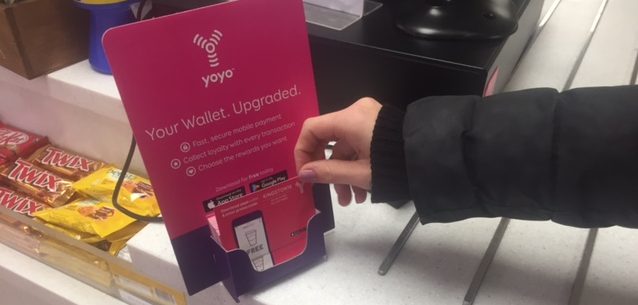Any Kingston University student that buys food from the cafeteria will now walk away with a little pink business card pushed into their hands alongside their lunch.
These business cards boast a newer, faster, easier way to pay for your food. By entering your credit or debit card details into their app, you can now pay for your food with a flick of your phone.
Yoyo wallet, unlike apple pay, has a rewards system which allows students to rack up points every time they buy something. These points can lead to freebies, rewards or discounts.
This, I think, is far more valuable to the seller than the buyer.
Yoyo wallet collects your information for the sellers and “matches your customers to what they buy, giving you deeper insights into their profile, preferences and behaviours”.
It is built less for the consumers and more for the producers of the world.
“With Yoyo Wallet, you can segment customers to your choosing, as well as use our built-in engagement platform to run effective mobile marketing campaigns,” according to their website.
Yoyo is, at its core, an advertising platform.
It collects information on the patterns of your purchases and fine-tunes ads they expect you to enjoy based off of your history.
Some might find this convenient, but I find it intrusive.
Even the ads on Facebook tailored to my search history is disturbing to me.
Any company that gathers information on my habits and behaviours rings warnings bells.
Yoyowallet does not explicitly state that it does so on their advertising throughout university but that information is readily available online on a page titled ‘yoyo for retailers‘.
I for one am a firm believer in the old saying,’don’t put all your eggs in one basket’. If your phone is stolen then so is access to your credit information.
To add to the danger of information gathering, it is no secret that online security is a farce. Every time you enter your personal details online you are taking a risk.
Your information is likely to be hacked and stolen, regardless of the reassurances from websites and apps claiming infinite security.
Power players such as eBay, Yahoo, MySpace, LinkedIn, Adobe, and even Uber who have all boasted strict security systems have all been hacked before, leaving their consumers information at risk.
Is it fair for our university to encourage students to trust an app that is only a few weeks old with our credit card information?
Yoyowallets founders history on their website shows that they have made a clear effort in establishing themselves in over 30 universities across the UK, students being their targeted audience.
Yoyowallet states that security is their number one priority, they maintain that no credit card information is hosted on their servers. More information on the advances in their security system can be found here.
But what is the security system of a new app compared to others such as Uber? They had also claimed to be completely secure. The choice is yours.
Will the University be held accountable if the app is hacked? Doubtful.

